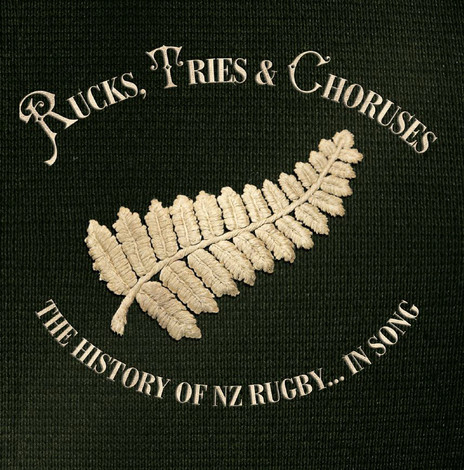1887-1979
Rugby union is entrenched into New Zealand’s psyche and is a major part of our collective DNA. A country that can boast three separate versions of ‘The Rugby Deck of Cards’ (based on the popular 1940s hit ‘Deck Of Cards’) has to be slightly obsessed with the game and its players. Many of New Zealand’s biggest musical names have written, sung or produced songs about our national game in a host of different genres over the decades.
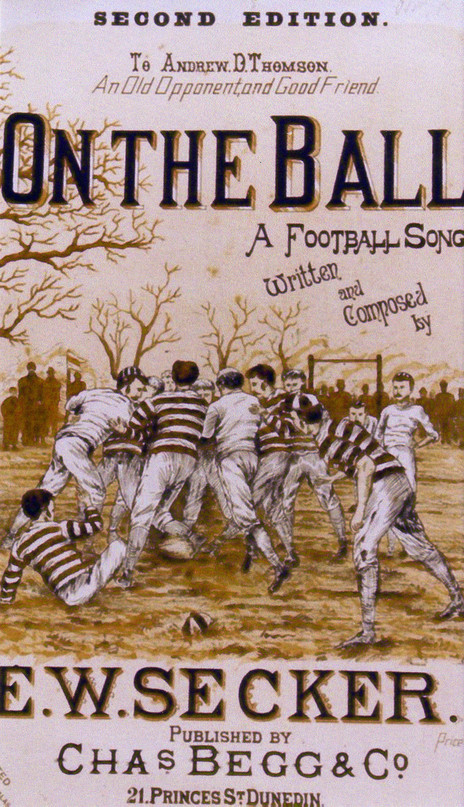
Manawatu accountant, musician and rugby player Ted Secker wrote 'On the Ball' in 1887 after his team had a losing streak
The very first local rugby song and only the second local song to be published in New Zealand was written in 1887 by English-born part-time musician Ted Secker: ‘On the Ball’. The captain of the 1887 Manawatu Unscorables, after seven consecutive losses Secker wrote the song to boost his team’s morale. During the following year it was sung by the 1888 Native Team on their tour of Britain. The 1905 “Originals” embraced the song during their tour of the British Isles and France. The song has remained popular at after-match functions since then. In 2010 Ceol Manawatu, a collective of Manawatu musicians, recorded their version of ‘On The Ball’ and released it as a digital single.
On the Ball, On the Ball, On the Ball!
Thro’ scrummage, three-quarters and all
Sticking together, we keep on the leather
And shout as we go ‘On the Ball’!
Before the recording industry found its feet in New Zealand during the 1950s, there were many rugby songs written that were published as sheet music only. One of the earliest was ‘’Welcome, All Blacks’ by HE Light and WW Boyes, published c1906. In 1924 came ‘The All Blacks (Rugby Football Boys) by Harry Hiscocks and Elizabeth Chandler; the song was subtitled “a song with a kick in it”. PW (Paul) Gregory’s ‘All Blacks’ Football Song’ appeared in 1956 and was later recorded by the Woolston Brass Band. In about 1960 songwriter and jazz musician Ken Avery – of ‘Paekakariki’ and ‘Tea at Te Kuiti’ fame – co-wrote ‘The Game is Football’ with Christopher Jarman and Perce Barlow.
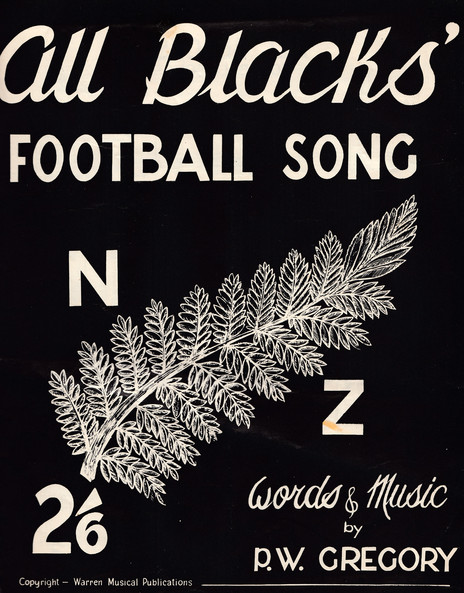
Paul Gregory's 'All Blacks' Football Song' was written at the time of the 1956 Springbok tour of New Zealand
One of the most enduring names in All Black history is George Nepia. He was selected as a fullback for the All Blacks tour to the UK in 1924-25, and he became one of the stars of the tour by playing in all 32 games.
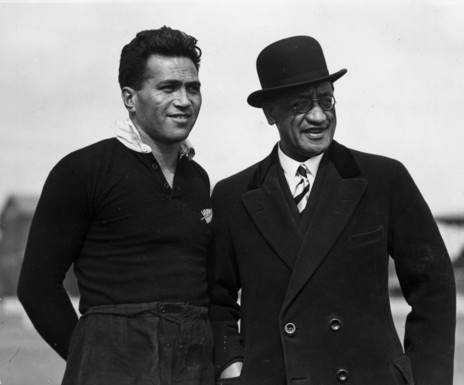
All Black fullback and singer George Nepia with songwriter Kingi Tahiwi, c1935. The occasion is thought to be a Maori v New South Wales match at the Sydney Cricket Ground. Alexander Turnbull Library, Wellington, 1/2-C-22477-F
Nepia wasn’t eligible for the following year’s tour to South Africa because of their apartheid policy at the time. Nepia returned to the All Blacks for tours to Australia in 1929 and played his last test against British Lions in New Zealand in 1930. In 1935 he captained the New Zealand Maori team to Australia. The financial strains of the Depression caused him to swap codes and play rugby league in England that year for Streatham and Mitcham, for £500 (equivalent to $58,500 in 2017). It was during his sojourn in the UK that he recorded his cousin Walter Smith’s composition ‘Beneath The Maori Moon’ at London’s Decca Studios. The song was released on a 78rpm disc in 1937 as Decca F5906.

An advertisement for songs recorded in the UK by former All Black George Nepia
In 1986, looking sprightly at 81 years of age, Nepia sang ‘Beneath The Maori Moon’ during an episode of This Is Your Life which was dedicated to him. He died later in the year.
Walter Smith also wrote ‘On!! New Zealand’, which he dedicated to the 1924-25 All Blacks. It received an enthusiastic response at its premiere performance by the visiting Dixie Jubilee Singers at the Auckland Town Hall on the 5 January 1925, just two days after the All Blacks had beaten England at Twickenham 17-11. However its melody was later said to be borrowed from the US university song ‘On Wisconsin’.
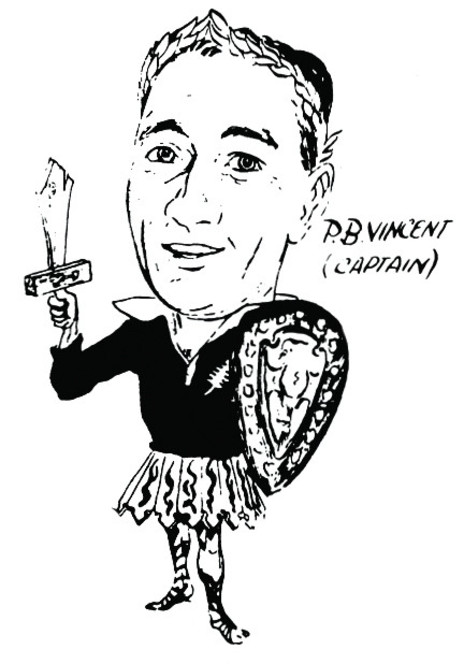
Pat Vincent captained the All Blacks for two tests during the legendary 1956 New Zealand tour by the Springboks. He was also a highly accomplished jazz singer
Possibly one of the biggest hospital passes in All Black history was received by Canterbury halfback Pat Vincent. Not only was he selected to make his All Black debut at age 30 against the 1956 Springbok touring team, but he was also made the Captain. The first test ended in a muddling 10-6 victory to the All Blacks. The second test with Vincent as captain resulted in an 8-3 defeat at a cold and blustery Athletic Park in Wellington. Pat was under instructions to pepper the Boks line with a kicking game in the strong southerly wind which led to one of the Boks’ tries in the low-scoring encounter. Seven changes were made to the team for the third test – including Vincent, who would never play for the All Blacks again.
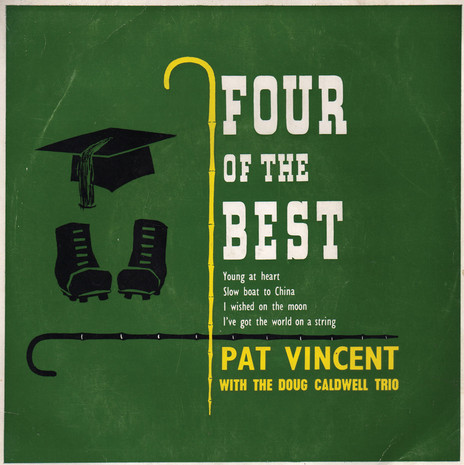
Pat Vincent's 1960 EP Four of the Best contained jazz standards, backed by the Doug Caldwell Trio. Vincent was a schoolteacher during the "amateur" era of the All Blacks
By all accounts Vincent was an affable person and took his dumping on the chin. He was an accomplished jazz vocalist and recorded two competent singles and an EP for Jack Urlwin’s Peak label during 1959-60. These were all recorded in Urlwin’s lounge, with a combo led by pianist Doug Caldwell. In 1967 Vincent took up a teaching/coaching job in California, and he died in 1983.
No Māori in that scrum
While driving to Wellington in 1960, Harry M Miller – the manager of the Howard Morrison Quartet – suggested to the group in the back of his Jaguar that it would be a good idea to record a parody song related to the imminent All Black tour to South Africa. Having already parodied Lonnie Donegan’s version of ‘The Battle of New Orleans’ as ‘The Battle of Waikato’.
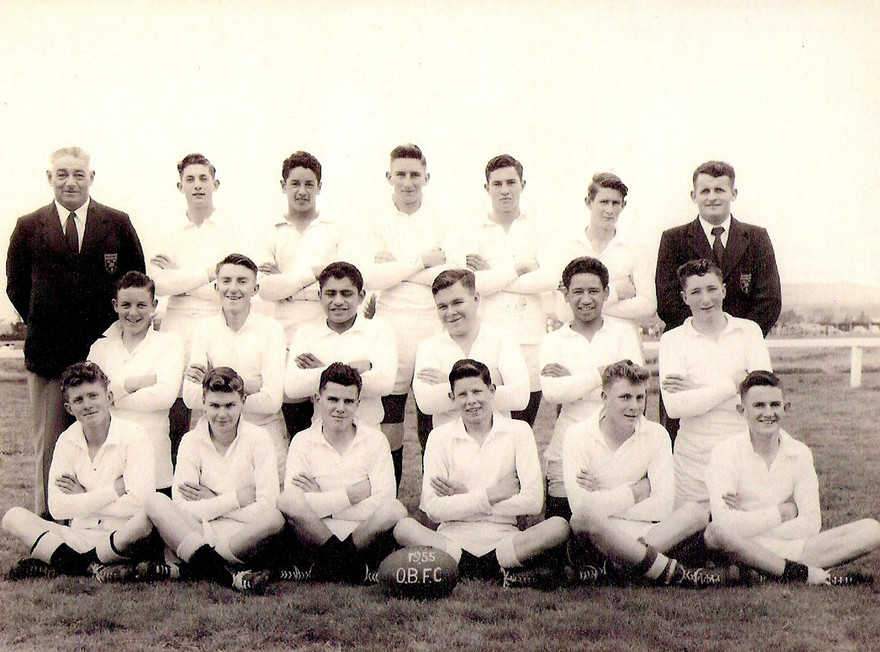
Gerry Merito, later with the Howard Morrison Quartet, is third from left in the middle row of this 1955 team photo
With guitarist Gerry Merito writing most of the lyrics, the Quartet quickly transformed Donegan’s latest No.1 hit ‘My Old Man’s a Dustman’ into ‘My Old Man’s an All Black’. The earliest opportunity to record the song was at a concert at the Pukekohe Town Hall. Morrison – whose father was a Maori All Black alongside George Nepia – recalled, “We recorded it at the end of the show, we used a tape recorder at the side of the stage with a little plastic microphone attached to the main stage microphone, pretty primitive. The audience were asked to stay behind and participate, which they did, I told them that this record was going to be huge and that this was their chance to help create history. Harry joked that the doors would be locked until a perfect take was recorded.”
Miller was happy with the second take while the Quartet was embarrassed that they had to even attempt a second one. The single was reputed to have sold 60,000 copies, which lead Morrison to comment later that it was the worst recorded song in New Zealand’s history – and the most successful.
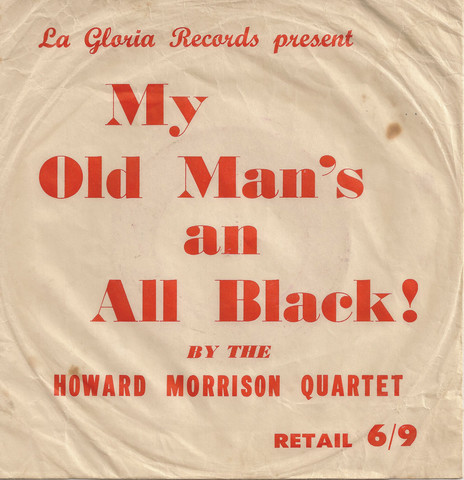
'My Old Man's an All Black!' - a massive hit for the Howard Morrison Quartet in 1960 - was subtly subversive
It was the era of the ‘No Maori, No Tour’ protests, and the Quartet spat out the climax of the song like a haka. Howard Morrison wrote the final line:
Tahi rua taniwha, they won’t take my old papa
Be bop a lula, give ’em pork and puha
Fee fee fi fi, fo fo fum – there’s no Horis in that scrum
In the early to mid-1960s, Westport radio station 3YZ was a home of broadcasting talent. Reon Murtha, Lloyd Scott, Peter Sinclair, Bill Toft, Ian Watkin, Bob Sutton, Warwick Burke and John Pike were just some of the announcers who either started or built their careers there. A good broadcasting team is only as good as its technical support and writers. 3YZ was lucky to have the witty producer/writer Alwyn (Hop) Owen on staff (he later founded the long-running RNZ Spectrum series). In 1960 Owen and station announcer Pike recorded ‘What is a Rugby Supporter?’ – a spoken monologue reminiscent of the newsreel shorts shown in cinemas before the main feature. Calling themselves The Rugbymen (with the Halftimers), it was released on Kiwi, backed with ‘The Rugged Rugby Playing Trail’.
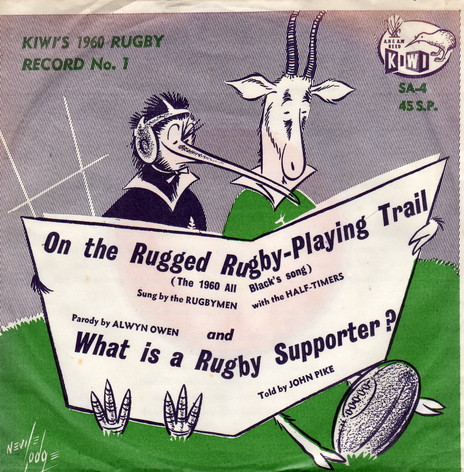
Westport broadcaster Alwyn “Hop” Owen was behind The Rugbymen’s parody ‘What is a Rugby Supporter?’, a spoken monologue voiced by John Pike and released on Kiwi in 1960.
As a follow-up, Owen wrote ‘Rugby Rock’, a tale about a young rock and roll fan who becomes a rugby fan after mistaking the queue for a rugby game for a rock and roll show. He is instantly converted to rugby to the point of tearing down his Elvis pin-ups from his bedroom wall in favour of a Colin Meads poster. Credited to John Pike with Hop Owen and the Hop-Heads, this Kiwi 45 featured a Peter Cape comedy skit ‘The All Black Jerseys’ as the B-side.
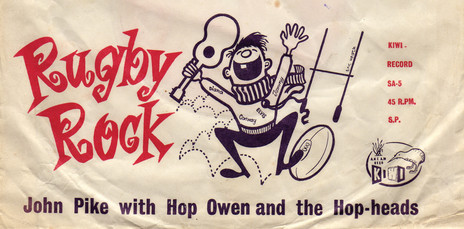
'Rugby Rock', in which an Elvis fan gives away rock and roll for rugby. Written and recorded by John Pike and Hop Owen of West Coast radio station 3YZ, 1960
Owen struck again with 3YZ’s rugby and racing announcer Reon Murtha. The two had collaborated on a comic skit called ‘The Musical Stakes’ which featured Murtha commentating on a classical orchestra’s performance as if it were a horse race. ‘The Musical Stakes’ was broadcast locally on 3YZ’s weekly Radio Scrapbook programme before being submitted to NZBC’s head office in Wellington for national airplay. As a result in 1962 HMV approached Owen and Murtha with an offer to release the track. A B-side was needed quickly, so the duo wrote ‘The Bargain Sale’, a rugby commentary based around a department store’s annual hat sale. And so was born the exploits of such vibrant bargain hunters as Chloe LaSalle, Mrs Moriarty, Myra McQuiligan, Mrs Mercatroid and Mrs O’Shaunassey as they tackled and scrummaged their opponents on the shop floor in pursuit of a snip. The record came with a warning on the back sleeve: “Remember time cannot change this recording. In 50 years time it will sound just as excruciating as it does today.”
1965: the Springboks return
The highly anticipated 1965 Springbok tour to New Zealand was hailed as a great chance for the All Blacks to win the four-test series as revenge for the narrow series defeat during the All Blacks’ tour to the Republic during 1960. A good measure of the rugby public’s interest can be gauged by the number of songs released, both before and after the tour. HMV artist Paul Walden, backed by Garth Young’s Group, released Ernie Rouse’s ‘The All Blacks Are Ready’. On the B-side was a rousing ‘When the All Blacks Go Marching In’, replete with a strident dixieland backing.
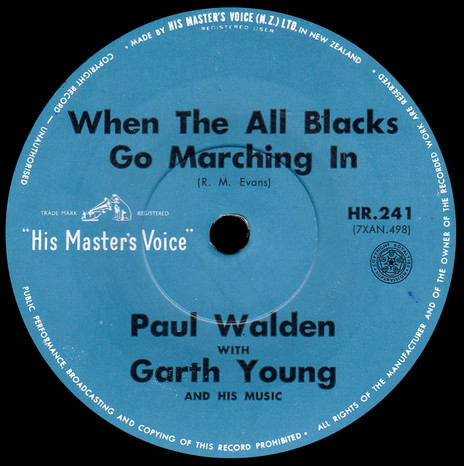
Paul Walden's 1965 single 'When The All Blacks Go Marching In' was recorded to dixieland jazz backing by Garth Young's Group
Also released on HMV at the time was Rod Derrett performing his song ‘The Springboks and the All Blacks’, accompanied by vocalists The Cambridge Trio. Even though Derrett is responsible for our unofficial national anthem ‘Rugby, Racing And Beer’, he seems rather bemused by the country’s obsession with rugby and the Springbok tour. This parody is not among his best: perhaps he had other things on his mind as ‘Puha And Pakeha’ was released a short time later.
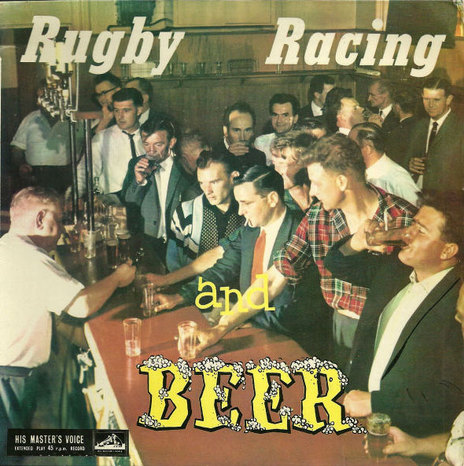
After the breakup of The Howard Morrison Quartet in early 1965, Gerry Merito embarked on a solo career. On his album I Must Have Been A Beautiful (Baby) Spaceman, Merito analysed a clash between the New Zealand Maori team and the Springboks to the tune of Johnny Cooper’s big 1955 local hit ‘One By One’. The game was played between the third and final tests with the series at 2-1 to the All Blacks. The Springboks used the game as a dress rehearsal for the final test and fielded a strong forward pack that saw the Maori scrum being pushed around the park all afternoon. To counter this the Maori team ran the ball at every opportunity and managed to keep the Boks try-less. The newspapers generally agreed that the Maori team lost the game in the forwards while Merito, with tongue in cheek, surmised in the last verse that they lost because there were “no Pakeha in the scrum”.
Hero Worship
While working at his father’s engineering factory as a process worker, young Doug Catley would often make up songs in his head to counter the boredom. One of Catley’s imaginary songs was based on the exploits of everyone’s hero, the great Don Clarke, a parody based on Jimmy Dean’s 1961 hit ‘Big Bad John’. In 1964, after a few drinks at a Karori cricket club Christmas do, Catley sang the song and much to his surprise was approached by an HMV representative who simply told him, “We have to record this”. A few days later Catley found himself in HMV’s Victoria St studio recording the song. ‘Big Bad Don’ became a big seller. Catley recalled, “Yeah, it was constantly on the radio and because it was on the charts I was considered a bit of a pop star, it impressed the girls, you could see them whispering and giggling to each other, for about a month or so until it slipped off the charts and radio stopped playing it and I reverted back to plain old Doug Catley that no one wanted to know.”
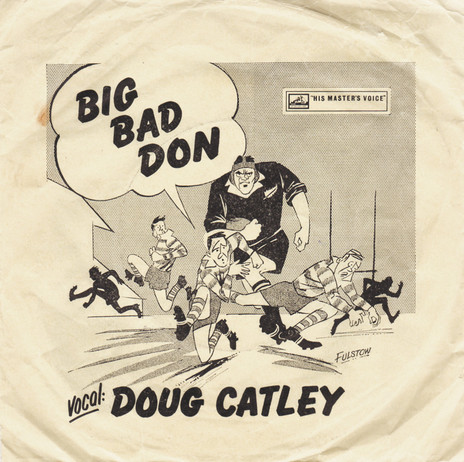
'Big Bad Don' was a tribute to high-scoring 1960s fullback Don Clarke, based on the hit 'Big Bad John'
The Welsh Rugby team visited New Zealand in 1969 and played two tests. Fergie McCormick, playing in his 12th test for the the All Blacks, kicked his way to a new world record for the most points in a test match. McCormick’s haul of 24 points included five penalty goals, three conversions and a 55-yard dropped goal. This feat was the inspiration for pop star and rugby fan Lew Pryme to extol the virtues of McCormick in song by writing ‘(The Feat of) Fantastic Fergie’, a parody to the tune of Johnny Horton’s 1960 hit ‘Sink the Bismark’. This was Lew Pryme’s last record release before starting a music management career. Over 20 years later, in the 1980s, he became the Auckland Rugby Union’s promotions manager.
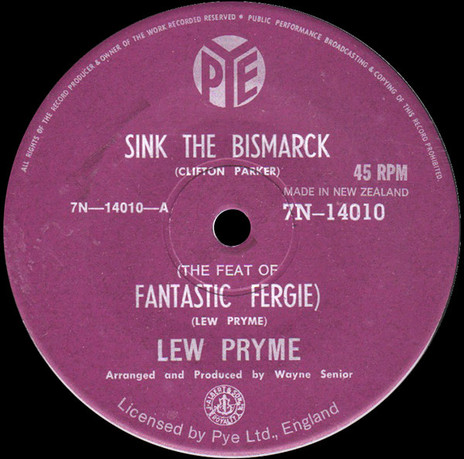
Lew Pryme's 1969 single 'The Feat of Fantastic Fergie' celebrated Fergie McCormick, a late 1960s All Black with a reliable boot. It was a parody written to the tune of ‘Sink the Bismarck’.
The 1970s
Compared to the giddy heights of the 1950s and 60s, there was a significant drop in the number of rugby songs recorded in the ’70s. Apart from the 1970 Canterbury Rugby team and the touring 1977 Lions, among the few rugby-related songs released were country efforts by Garner Wayne. On the 1970 Viking LP Garner Wayne Rides Again the ‘Love in a Fowl House’ hitmaker released ‘All Black Hall of Fame’ and managed to namecheck 64 All Blacks from the past in his imaginary rugby museum. In 1976 Gray Bartlett and Brendan Dugan released ‘All Black’s Song’ to celebrate that year’s All Black tour to South Africa.
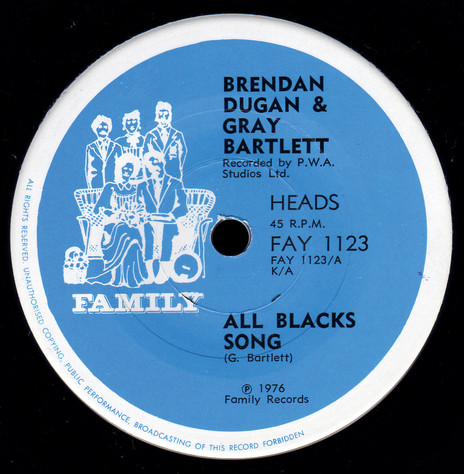
Brendan Dugan and Gray Bartlett released 'All Black's Song' in 1976, to mark the team's controversial 1976 tour of South Africa
The only New Zealand rugby squad to record and commercially release a song was the 1970 Canterbury side which assembled at the HMV Studios. Led by musical arranger Garth Young and producer Peter Dawkins, they recorded ‘The Name Of The Game’. Written by Wally Chamberlain, the song celebrated Canterbury’s reclaiming of the Ranfurly Shield. Unavailable for the session, because they were with the All Blacks touring South Africa, were Canterbury stalwarts Fergie McCormick, Wayne Cottrell, Alister Hopkinson and Grizz Wyllie. “Thank Christ for that,” remarked a nonplussed Wylie later. ‘The Name of the Game’ was released as HMV single HR 402 in July 1970, the same month as Hogsnort Rupert’s ‘Pretty Girl’ and Quincy Conserve’s ‘Ride The Rain’.
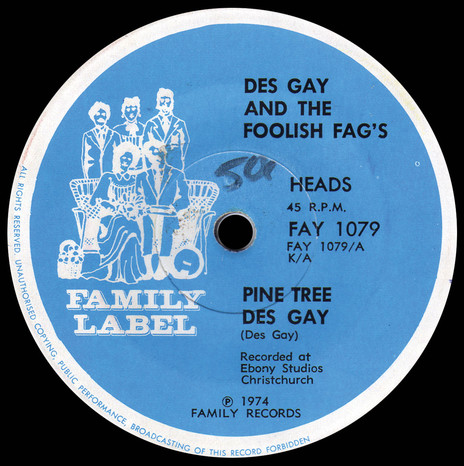
Des Gay and the Foolish Fags was the pseudonym of a Christchurch breakfast radio DJ. 'Pine Tree' was about a gay man obsessed by Colin Meads
A curiosity appeared in 1974 when the pseudonym Des Gay & His Foolish Fags was used to hide the identity of a popular Christchurch breakfast DJ who recorded a one-off novelty song featuring Colin Meads called ‘Pine Tree’. The song is about an overtly gay man who wants to emulate his hero but is repulsed by the smell of liniment and doesn’t like to get his jersey dirty. Released by Family in 1974 (FAY 1079), the B-side was ‘Ballad of Des Gay’.
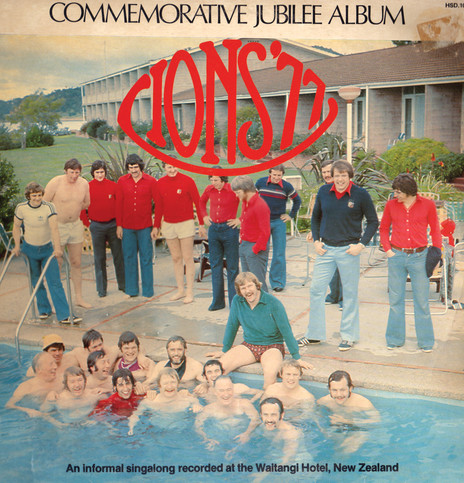
During their 1977 tour of New Zealand, the British Lions rugby team took time out to frolic in the Waitangi Hotel pool and record an album of singalong songs
Another rugby novelty belongs to the British Lions team which toured New Zealand in 1977. A week before its three-month visit finished, the team recorded an album of singalong songs to mark the Queen’s Jubilee that year. An EMI mobile recording unit was dispatched to the Waitangi Hotel where the team were based for its game against North Auckland. The 30-man squad included 17 Welshmen, and the songs they recorded – just a week before their three-month tour finished – were as diverse as ‘Summer Holiday’ and ‘Flower of Scotland’.
---
Read Paint It, Black – part two of this story
Visit New Zealand On Screen's collection of rugby documentaries
Grant Gillanders compiled the definitive anthology of New Zealand rugby songs, Rucks, Tries and Choruses (EMI, 2011)
